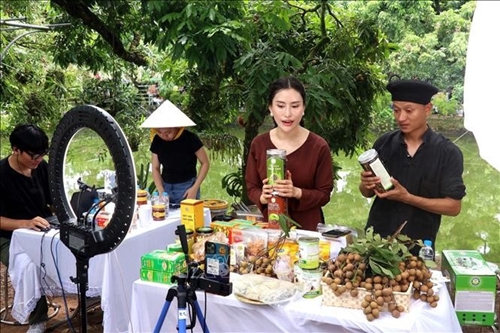Prime Minister Pham Minh Chinh on June 18 issued Directive No.18/CT-TTg, which emphasizes the need to step up trade promotion efforts both domestically and internationally. The key focus of this directive is to encourage commercial activities on digital platforms, reduce dependence on traditional methods, and expand export markets through trade agreements.
    |
 |
|
Content creators help farmers in Hung Yen province promote and sell longan and OCOP agricultural products on TikTok. |
Experts said digital transformation in trade promotion involves deploying technologies such as e-commerce, big data, and artificial intelligence to conduct product marketing, business matchmaking, and partner searches. Compared to conventional models, this approach allows enterprises to reach customers faster, at lower cost, and with greater flexibility.
By early 2025, approximately 32% of small and medium-sized enterprises (SMEs) had formed international business connections through online platforms. Cross-border e-commerce is becoming a significant trend, driven by platforms such as Amazon, Alibaba, and Shopee Global, which have created easier avenues for Vietnamese products to reach consumers around the world.
BaKa Co. Ltd. in central Gia Lai province, a speciality coffee producer, reported that its weekly livestream sessions – combining demonstrations of its closed-loop production process with direct promotional offers – have driven a revenue increase of over 30%.
Do Thi Gam, chairwoman of Ngoc Tra ecological herbal cooperative in Ninh Binh province, said her cooperative has attracted a substantial new customer base across several provinces and cities after receiving training in livestream techniques and effective product presentation. It now sells over 100kg of herbal products monthly, reaching 200kg in peak months.
The Hena Agricultural Cooperative in Dak Lak province, which specializes in essential and cold-pressed oil, noted that building its brand on social media and e-commerce platforms has helped it access new customer segments and secure production and distribution deals with major partners in Malaysia, Taiwan (China), New Zealand, and Australia.
Van Quoc Viet, Director of Ngon Avatar Company, remarked that in the past, the firm had to participate in regional trade fairs or rely on agent networks to promote its coffee products. Now, with just a mobile phone and a stable internet connection, Ngon Avatar can introduce products directly to consumers nationwide, he said, adding that the costs have fallen, while the impact has risen significantly.
To support businesses in this shift, the Ministry of Industry and Trade’s Vietnam E-commerce and Digital Economy Agency announced plans to enhance training programs, especially via online formats tailored to businesses' needs. Upcoming initiatives will focus on four key pillars: Go Online, Go Export, Go AI, and Go Right.
Vu Ba Phu, Director of the Vietnam Trade Promotion Agency (Vietrade), affirmed that future trade promotion will adopt a hybrid approach, blending traditions and modernity in association with e-commerce and digital economy.
Source: VNA